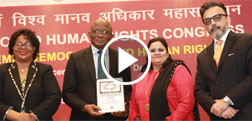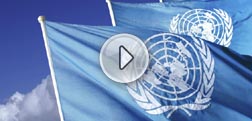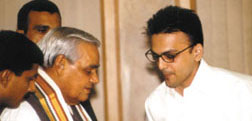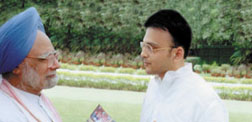Information Centre
Categories
Examinations
Statement of VIPs
Address by the Hon’ble President of India Smt Droupadi Murmu on the occasion of Human Rights Day |
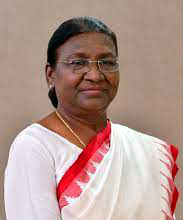
New Delhi, 10th December 2022. I am glad to be participating in the Human Rights Day celebration organised by the National Human Rights Commission. It is an important occasion for the whole of humankind, as it was on this day in 1948 that the United Nations General Assembly adopted the Universal Declaration of Human Rights, also known as UDHR. The adoption of the UDHR was a landmark event in world history. Today, there is a high degree of awareness about the concept of human rights. The principle of equality underpinning it has been widely accepted. But nearly 75 years ago, the world was a bit different. A large number of human beings were treated as less than equal. The advent of modernity, it seemed, had dispelled the clouds of the dark ages, but the sun of progress was yet to shine everywhere. At that point, the world leadership got together, drafted this milestone document, and proclaimed that each of us, as a human being, is entitled to basic rights. Today, we fail to understand why something as simple as basic dignity could be denied to someone solely on the basis of their race, religion, gender or language, or where and in which group they were born. Any mention of the UDHR is bound to remind us of the incomparable contribution made by an Indian to its drafting. Hansaben Mehta, as you know, was India’s representative to the UN Human Rights Commission. When the very first line was drafted as “All men are born free and equal”, it was Hansaben who suggested changing it to “All human beings are born free and equal”. A minor correction, with major implications. She was a disciple of Gandhiji and widely participated in the freedom struggle, which, I think, explains her refined sensitivity. Yet, progress towards equality has been a slow journey in many places. The text of the UDHR is said to have been translated into more than 500 languages, which makes it the most translated document in history. Still, when we consider the sad developments that keep taking place in many parts of the world, we wonder if the declaration has been read at all in some of those languages. Ladies and Gentlemen, The fact remains that human rights are a work in progress around the world. At home, however, we can take solace in the fact that the National Human Rights Commission has been making the best possible efforts to spread awareness about them. Now in its 30th year, the NHRC has done a commendable job of protecting as well as promoting human rights. It also participates in various global forums for human rights. India is proud of the fact that its work has been appreciated internationally. It has been enjoying the ‘A status’ accreditation with the global network of National Human Rights Institutions called GANHRI. It is highly notable that the NHRC has been pro-active in taking up redressal in a range of issues, from child labour and bonded labour to health and mental health, disability and elderly persons, women, children, LGBTs and more. During the Covid-19 pandemic, I am told, a team from the NHRC visited a hospital to ensure no one was denied admission and treatment. It also prepared and issued advisories to ensure all human rights were respected in the authorities’ response to the pandemic. In addition, the Commission also promotes research on these and other matters. It has supported research on, for example, the criminal justice system. I had an opportunity last month to share my views on the plight of undertrial prisoners. In that case, and also in many other cases, I believe, our intentions are always noble, yet they need to be followed up vigorously to give positive results. That is why developing sensitivity and sympathy is the key to promoting human rights. It is essentially an exercise of the faculty of imagination. If we can imagine ourselves in the place of those who are treated as less than human, it will open our eyes and compel us to do the needful. You might have heard of the so-called ‘golden rule’, which says: Treat others as you would like them to treat you. That sums up the human rights discourse beautifully. Ladies and Gentlemen, Today is the beginning of the worldwide, year-long celebrations of the 75 years of the UDHR. The United Nations has chosen ‘Dignity, Freedom and Justice for All’ as the theme of the year 2022. That is close to the ideals expressed in the Preamble of our Constitution. What do we mean by ‘Justice’? The Preamble explains it is “Justice, social, economic and political”. I have said before that we should strive to expand the notion of justice. Over the past few years, the world has suffered from a high number of natural disasters caused by unusual weather patterns. Climate change is knocking on the doors. People in the poorer nations are going to pay a heavier price for the degradation of our environment. We must consider the environmental dimension of justice now. The challenge of climate change is so enormous that it forces us to redefine ‘rights’. Five years ago, as you know, the High Court of Uttarakhand held that the Ganga and Yamuna rivers have the same legal rights as human beings. But why stop at only two rivers? India is a land of sacred geography, with countless holy lakes, rivers and mountains. To these landscapes, the flora and fauna add rich biodiversity. In old times, our sages and seers saw them all as part of a universal whole, along with us. So, just as the concept of human rights exhorts us to consider every human being as no different from us, we should treat the whole living world and its habitat with respect. I wonder what would the animals and trees around us tell us if they could speak. What would our rivers say about human history and what would our cattle say on the topic of human rights. We have trampled on their rights for long, and now the results are before us. We must learn – rather re-learn – to treat nature with dignity. This is not only a moral duty; let us remember it is necessary for our own survival too. I congratulate the NHRC and the State Commissions, all members and officials associated with them, as well as the human rights activist community around the world on the Human Rights Day. I thank the NHRC chairperson, Justice Arun Kumar Mishra, for granting me this opportunity to share my views with you all. My best wishes to you. Thank You, Jai Hind! |
Message of President of The United States of America Mr. Joe Biden on the occasion of Human Rights day 10th December 2021 |
|
In the wake of the devastation of the Second World War, leaders from around the world came together with a shared vision to promote a safer future for all nations by securing and advancing the human rights of everyone, everywhere. On December 10, 1948, thanks to the moral leadership and service of Eleanor Roosevelt as the first Chairperson of the Commission on Human Rights, the world took an enormous step forward with the creation of the Universal Declaration of Human Rights (UDHR). The UDHR enshrines the human rights and fundamental freedoms inherent in all people — no matter who they are, where they come from, or whom they love. It is a foundational document that proclaims a truth too often overlooked or ignored — that “all human beings are born free and equal in dignity and rights.” From the root of this universal ideal has sprung transformational human rights treaties and a global commitment to advance equality and dignity for all as the foundation of freedom, peace, and justice. As a world, we have yet to achieve this goal, and we must continue our efforts to bend the arc of history closer to justice and the shared values that the UDHR enshrines. Just as we advocated for the recognition of universal human rights following World War II, the United States today remains steadfast in our commitment to advancing the human rights of all people — and to leading not by the example of our power but by the power of our example. Since taking office, my Administration has put human rights at the center of our domestic and foreign policy priorities. We immediately declared our intention to rejoin the United Nations Human Rights Council, and with the widespread support of the international community, our Nation was elected to a new term beginning on January 1, 2022. As a member of the Council, we will highlight the vital importance of democracy as we work to protect human rights and hold accountable those who would violate these rights and freedoms. We will continue to call out human rights violations wherever they occur, support brave activists on the front lines of protecting fundamental freedoms, and invest in strengthening the rule of law. As a global champion for democracy, we must also continue the unceasing work of strengthening our own democracy and building a more perfect union. Leading by example is one of the most powerful and persuasive foreign policy tools at our disposal. From day one of my Administration, we have taken concrete steps to reassert our moral leadership on the global stage. On my first day in office, I signed an Executive Order to advance racial equity and support for underserved communities. As part of our once-in-a-generation investment in our Nation’s physical infrastructure, we are also strengthening equitable access to our shared resources and environment, including providing additional support for historically underserved communities. Unfortunately, discrimination and violence are challenges that too many Americans still face in their own communities. Throughout our Nation’s history, generations of Black and Brown Americans, Indigenous persons, people with disabilities, LGBTQ+ Americans, immigrants, women and girls, and members of religious, ethnic, and other historically marginalized groups have faced heightened threats to their human rights and dignity. Today, we know that our efforts to defend human rights around the world are stronger because we acknowledge and seek to remedy our own historical challenges as part of that same fight. Leading by example means speaking honestly about the past, upholding the truth, and striving constantly to improve. This year, as we commemorate Human Rights Day, my Administration will bring together global leaders, civil society organizations, and representatives from the private sector for the first Summit for Democracy. Working together, we will recommit ourselves to promoting respect for human rights and combating growing threats to democracy, including authoritarianism and corruption. We will speak honestly about the challenges we face, and we will identify meaningful new actions and commitments to advance our shared goals. I call upon all Americans to keep the words of the Reverend Dr. Martin Luther King, Jr. in their hearts: “injustice anywhere is a threat to justice everywhere.” Let us all dedicate ourselves to bringing our Nation and our world closer to a future in which every human being is free to pursue their highest dreams and unleash their full potential. NOW, THEREFORE, I, JOSEPH R. BIDEN JR., President of the United States of America, by virtue of the authority vested in me by the Constitution and the laws of the United States, do hereby proclaim December 10, 2021, as Human Rights Day and the week beginning December 10, 2021, as Human Rights Week. I call upon the people of the United States to mark these observances with appropriate ceremonies and activities. IN WITNESS WHEREOF, I have hereunto set my hand this ninth day of December, in the year of our Lord two thousand twenty-one, and of the Independence of the United States of America the two hundred and forty-sixth. |
United Nations Secretary-General António Guterres remarks on Human Rights Day, 10 December 2023. |
|
“All human beings are born free and equal in dignity and rights.”The iconic opening sentence of the Universal Declaration of Human Rights is as important today as it was when it was adopted 75 years ago. The Universal Declaration is a roadmap, helping to end wars, heal divisions and promote lives of peace and dignity for all. But the world is losing its way. Conflicts are raging. Poverty and hunger are increasing. Inequalities are deepening. The climate crisis is a human rights crisis that is hitting the most vulnerable hardest. Authoritarianism is on the rise. Civic space is shrinking and the media is under attack from all sides. Gender equality remains a distant dream and women’s reproductive rights are being rolled back. Today, it is more important than ever to promote and respect all human rights – social, cultural, economic, civil and political – which protect us all. The Universal Declaration shows the way to common values and approaches that can help resolve tensions and create the security and stability our world craves. As we work to update global frameworks and make them more effective in the 21st century, human rights must have a unique and central role. I call on Member States to use this 75th anniversary, and the Summit of the Future next year, to strengthen their commitment to the timeless values of the Universal Declaration. And on Human Rights Day, I urge people around the world to promote and respect human rights, every day, for everyone, everywhere. |
Volker Türk, UN High Commissioner for Human Rights at High-Level Event Commemorating the 75th Anniversary of the Universal Declaration of Human Rights (10th December 2023)- Opening Ceremony with Heads of State |
|
Excellencies,Colleagues,Friends, A warm welcome to you all. This is a pivotal day. We are here to rebuild a foundation of hope. Hope that we need now, perhaps more than ever, at this sombre moment in history. Disorder and division. Complex and bitter geopolitics. Deepening inequalities. And fear. Disorder and division. Complex and bitter geopolitics. Deepening inequalities. And fear. Unbearably, in the Occupied Palestinian Territory and Israel – yet again; as well as in Ukraine, Sudan, Myanmar and far too many other places, conflict, intractable and brutal, is inflicting terrible suffering on civilians, without remorse. Trust – in each other, and in the institutions that guide us – is in freefall. We are backtracking on the crucial ambitions set out in the Sustainable Development Agenda. Civic space is being strangled, silencing the voices that can power the change we actually need. The climate crisis is burning up our world. These and other crises are the consequences of failure to uphold human rights. They are not the failure of human rights: they bear witness to the damage that is done when human rights are ignored and violated. Excellencies, Yesterday, communities from every region called urgently for change, proposed transformative ideas and made commitments. And over 155 States announced their own pledges on a wide range of human rights issues. From advancing women’s rights, and children’s rights, to tangible commitments on climate change. From empowering people with disabilities to ensuring legislative reforms that promise lasting impact on people’s lives. I am very grateful for this surge of transformative promises. Today, I am asking you to shift from the specifics of your national or individual perspectives to four key discussion areas about how we can make human rights central to all policy-making and all action, now and in the future. Human rights is a global public good – and as leaders, you are entrusted with the duty of advancing it. First, peace and security. Every individual has the right to live in peace. And all human rights measures ultimately contribute to preventing tensions and conflict. War polarises. It divides. It dehumanises the other; it impels us to take positions for and against – a binary view: human versus inhuman. But human rights cut through these divisions. Radically, they value each and every human being -- regardless of which side they stand on. As leaders, I ask you to contribute to a deep reflection of how we can move human rights back to the centre of decision-making, to prevent the scourge of war. Second, digital transformation. We are all aware about the immense potential benefits. But let us be honest: from artificial intelligence to neuro-technology, cyber-crime, surveillance and bioweapons, we are faced with a world where the fundament of humanity – human dignity and human agency – is at risk. This is the question we need to address: how to protect our humanity and our rights in this new universe? Third, our economies. I am absolutely convinced that our economic systems, at all levels, will need to be infused with human rights, and this, too, will require a radical transformation – not least, in light of the green and social transition under way, as well as the massive global inequalities we face. But how do we go about this? Fourth, human rights are part of the ecosystem that ensures humanity can survive and thrive. Our planet is in profound crisis because we have ignored the right to a clean, healthy and sustainable environment for much too long. What will it take to place human rights – not business interests – at the centre of all national and global policy? Human rights conversations can be sensitive, difficult and uncomfortable, speaking truth to power. They are often meant to flip orthodoxies and can therefore be radical. But they must always take place in a spirit of respectful and constructive engagement in the search for a better world. I’m asking you to come together, transcending different societies and systems, to seek out areas of agreement and ensure meaningful change. Seventy-five years ago, our forebears took on this role. They overcame their differences, and they set out the steps that would create the foundations of freedom, justice and peace in the world. It is our turn now to take on this profound and visionary task of ensuring that human rights become both the overarching goal and the guardrails, and that we strive for solutions to the most pressing challenges of our time. Human rights principles are our best solution to this fraught and frightened world. I entreat you to rekindle the spirit, impulse and vitality that led to the Universal Declaration 75 years ago. Thank you. |
Speech by Shri M. Venkaiah Naidu, Honourable Vice President of India at the Human Rights Day, organized by the National Human Rights Commission, in New Delhi on December 10, 2017. |
|
Our commitment for human rights is part of our culture, from time immemorial it always respected others Human Rights. We have a noble saying called “Sarve Janah Sukhino Bhavantu,” We believe in the principle of “Vasudhaiva Kutumbakam- The entire Universe is one Family”. Civil rights, Minority rights and others are guaranteed in India not just because they are in the constitution, they are guaranteed because they are part of our DNA. “Secularism which got included in the constitution at a later stage is ingrained in our DNA from the beginning,” India as a country has no history of aggression of any kind. We tried to assimilate all the people who have come here.
Women constitute 33% in majority of local bodies, and 50% in many of the state. I believe in the coming days we will have considerable representation even in the legislature and also in Parliament.
We have retired Chief Justice of India as the Chairman of the National Human Rights Commission, that itself shows our commitment to Human Rights.
We are all engaged in eradicating poverty. We have chosen the path of inclusive growth that is including the people in the developmental agenda of the nation. Welfare measures taken by the government such as Jandhan, Mudra and others are moving in a direction to eradicate poverty.
These challenges are sometimes being exploited for personal, political and sectarian gains and that is a big challenge to us.
We as a nation believe in peaceful co-existence, but unfortunately some people take terror as a state policy. Terror has no religion, but unfortunately some people are give a communal colour and using it as protection. “Terror is the enemy of Humanity” I hope the United Nation Security Council completes the consultation at the earliest, and come to conclusion to take firm action against terror.
THANK YOU, JAI HIND! |
Address of Mr. Justice Arun Kumar Mishra, Hon'ble Chairperson, National Human Rights Commission On Human Rights Day, 10th December 2023 |
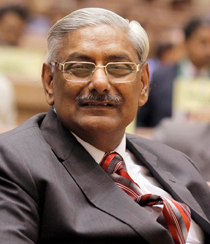
Hon’ble Vice President of India, Esteemed Members of the Commission, Present and former Judges of the Supreme Court, Judges of the High Court of Delhi, Chairpersons and Members of Tribunals, National Commissions and State Commissions, Officers of the Central and State Governments, Office Bearer and Representatives of the UN Organizations, Diplomats, Ld. Members of the Bar, Media Persons, Civil Society Members, Distinguished Invitees, Dear Students, Ladies and Gentlemen. Today, we have assembled here to celebrate the 75th Human Rights Day. It is Amrit Kaal of our independence and signifies 30 years journey of NHRC. I welcome and congratulate all. Hon’ble Vice President Shri Jagdeep Dhankhar is a jurist who has always fought for the rights of the people. He always stood against injustice and is committed to the basic values of our cultural ethos. He has been a source of strength to all of us. Human Rights Day is a reminder of equality, justice, freedom, and respect for human rights. NHRC is committed to protecting and promoting the human rights of people in India. Vedas, Upanishads, and various Dharma Shastras resonate with principles that align with the essence of human rights, respect for individuals’ intrinsic worth, and the need for ethical conduct in society. Our cultural ethos and values are reflected in our Constitution—the Universal Declaration of Human Rights contains ideals that conform to our values. Indian culture is for standing on the side of justice. The Gurukul system, depicted in texts like the Mahabharata, underscores the importance of education, emphasising the right to access knowledge. History shows that India has always been rich and diverse in cultures, religions, and traditions. We believe in non-violence as violence and human rights are opposite. The ethical ramifications of advancing technologies are a matter of grave concern. Challenges of modern technology weave through the fabric of contemporary society. Dramatic rises in inequality and the triple planetary crisis, climate change, biodiversity loss, and pollution require immediate attention. New digital technologies have transformed the way people live. Also, help drive progress for all the Sustainable Development Goals (SDGs). The Internet is useful but also has a dark side, infringing on privacy through the spread of hate speech misinformation, undermining democratic processes, and increasing online violence against women and children. When improperly or maliciously used, it can fuel divisions within and between communities to undermine human rights. Business enterprises are a major source of investment, innovation, and development and can be a significant driver in achieving the Sustainable Development Goals. At the same time, businesses must effectively address human rights concerns. Institutions of local self-governance, Municipal and Panchayat bodies play a crucial role in advancing human rights and promoting the concept of ‘fraternity,’ improving the quality of life by ensuring clean water supply, water, sanitation, and public health, and ensuring equality for citizens. These institutions are indispensable in implementing constitutional values “Swaraj” on the ground. The Municipal bodies and Panchayats must effectively and transparently discharge their statutory civic functions enjoined upon them. The persistent problems of food insecurity, mental health stigma, and displacement due to various factors further underscore the intricate web of human rights challenges. The people have to be at the centre of all our development efforts, which is human-centric. We must not leave anyone behind. We must support the vulnerable by affirmative action. Women and children must be kept at the centre of achieving sustainable development goals. Human rights can only be fully upheld if all women and children feel safe and secure and have improved quality of life. They will enjoy their rights when these goals are achieved. In an inter-dependent world, the COVID-19 pandemic, which not only disrupted the world economy and livelihood but took away millions of lives, has shown that there is a need for transparency in information sharing and collaboration to focus on building resilient framework, which will serve not only present but future generations and holistic wellbeing of the entire Humanity. India has provided COVID-19 test kits and other equipment and ensured COVID-19 vaccines to over 100 countries when other countries could not render help. Simultaneously, it administered more than two billion doses to people in the country in less than eight months. India also developed a digital framework for hospital management and administering vaccines, which we shared with the rest of the world. During such a devastating pandemic, when people could not go to work, India started providing food grains to 800 million people, which reflects concern for human rights. We faced problems of spurious drugs, medicines, and food adulteration, which must be dealt with stringently and expeditiously. Another issue faced by the young generation is drug addiction, which is a matter of grave concern. The young generation has become vulnerable. They have to live with the consequences. Our responsibility is to act decisively, not to contain but to eliminate the availability and use of drugs. Terrorism causes grave violations of the human rights of citizens. In the whole world, it has been seen that innocent people suffer. Condoning or sympathising with terror activities and terrorists is a great disservice to the cause of human rights. We must not glorify or sympathise with them. NHRC India recently hosted the 28th Conference of Asia Pacific Countries. It brought out the ‘Delhi Declaration’ unanimously, incorporating Indian ethos. NHRC recognises the crucial role played by human rights defenders, and a Core Group has also been formed. NHRC regularly interact with civil society representatives and human rights defenders on various issues. I want to highlight here that the National Human Rights Commission works in partnership with various stakeholders. In a democracy, the government ensures individuals’ rights and provides basic amenities for improved quality of life. NHRC has Net Portal to lodge and track online complaints, the progress and outcomes of complaints. Anyone from anywhere may submit a complaint on behalf of victims in any language. There is no requirement for an affidavit or an advocate; complaints are dealt with expeditiously. Commission believes in reaching out to people, organising open hearings/ camp sittings, and meeting with the press in different parts of the country. NHRC has a proactive approach to solving cases related to human rights violations. As to issues of critical importance, the Commission takes systemic measures, organises open house discussions, and holds seminars and meetings of core groups with different stakeholders. Based on the same, Advisories are finalised and issued with actionable points exercising the powers under Sec.12 of the Protection of Human Rights Act, 1993. In the recent past, the NHRC issued advisories, including the Advisory on Mental Health, Rights of Truck Drivers, Environmental Pollution and Degradation, the Welfare of Transgender Persons, to mitigate Deliberate self-harm and suicide attempts by prisoners; Child Sexual abuse Material; and to Prevent, Minimise, and Mitigate Ocular Trauma, amongst others. Let me flag a few burning issues with huge ramifications on human rights on a vast scale. Firstly, poverty impedes people from thoroughly enjoying their human rights. Ensuring housing, clean tap water, toilets, electricity, cooking gas, and access to healthcare and banking services ensures human rights and dignity to individuals, emphasising that no one is left out, the Commission issues direction. Digital governance has resulted in rooting out corruption. The war against poverty must not only be continued but also accelerated so that the people of this country have an improved quality of life and live with dignity. Secondly, climate change - Increased frequency and intensity of extreme weather events like prolonged droughts, high-intensity rainfalls, cyclones, and floods pose enormous challenges. It affects human rights, as it causes loss of lives and livelihoods, displaces communities, disrupts access to resources, and increases conflicts over scarce resources. Climate-induced crisis is a global issue. The developed countries have contributed substantially to creating this crisis. Poor are the worst affected. Thus, it is the duty of the rich to contribute to mitigating the crisis. When the poor consume electricity, it brings light to their homes so children can read and write. Thirdly, harmonising human rights in business. With expanded economic activities, high economic growth, and rising prosperity, India is also developing into a major manufacturing hub. It is, therefore, essential to harmonise human rights and climate issues in business. Fourthly, women’s empowerment in the workplace is a critical aspect of fostering gender equality. Ensuring workplace security is essential to creating an environment of dignity where women can thrive professionally without facing discrimination, harassment, or unsafe conditions. Many of our daughters are going to workplaces to master professionally. It becomes much easier if there are two earning members in each family instead of just one. Fifthly, cyberspace must be safe and secure. Cyber crimes infringe on the very right to life and dignity, violate human rights in several ways, and National security compromised. Digital forensic and regulatory regimes must keep pace with technological advancement. International cooperation is required to keep cross-border cyberspace beneficial to Humanity, considering 96% is the dark web. Similarly, we have to care for AI and deep fake. Lastly, I would like to mention that vulnerable groups, including transgender, Persons with Mental Illnesses, sex workers, beggars, destitute, elderly, orphaned children, and persons in need., must be strengthened and empowered. Their human rights violations must be addressed on priority, with sensitivity to their plight. We must do everything in our capacity and beyond to make their lives more meaningful and dignified. Our Strength is unity in diversity, embracing “Manav Dharma,” i.e. Humanity is our religion. Mahopanishad propounded that the highest attainment for humans is “VASUDHAIVA KUTUMBAKAM”, i.e. “One Earth, One Family, One Future” has never held more resonance. This statement is not just a call for unity; it’s an affirmation of our shared destiny and mutual responsibility as inhabitants of a single planet. Our scripture records “Surve Bhavantu Sukhinah”, meaning let the entire world be happy, which is part of our cultural ethos and philosophical thinking. The theory of karma for the enjoyment of rights finds a place in Art—51A of our Constitution. Let us vow to work together to fulfil the aims. In an age marked by rapid technological advances, globalisation, and an increasingly interwoven sociocultural fabric. May our shared commitment propel us toward a tomorrow where the inherent dignity and rights of every person are acknowledged and protected by all. |
Excerpts from the Inaugural Address of Mr. Justice J S Verma, the then Chairperson, National Human Rights Commssion on the occasion of the inauguration of the Indian Institute of Human Rights on 10 December 1999 (Human Rights Day) at New Delhi. |
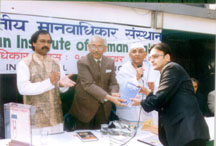
Today is the Human Rights Day and I am glad to note that the Indian Institute of Human Rights is being established on this auspicious occasion. All members of the human family must be treated as equal - equality being a human right. Human Rights are all those characteristics or attributes that are essential to life with dignity. The violation of human rights occurs when any act, or omission to act, results in a conseqence that is inconsistent with the dignity of the individual. Human Rights are natural rights which are non negotiable and do not depend on conferment by any authority. They are inherent in human existence. Enacting law is not enough unless there is a change in the thinking process of society as a whole. The remedy lies in education within the family, from the earliest stage of life and throughout society. The acknowledged index of civilisation for each country is its track record of respect for human rights in the country. There is an urgent need to rededicate to the upliftment of the common man and for developing a human rights culture in every sphere of life and in the instruments of governance. The main objective of the Institute should be to make the Protection of Human Rights Act as effective as possible by reading into it the intent behind the legislation and interpreting that to its fullest extent. The National Human Rights Commission is a complement to the institutions of the judiciary. The increase in the number of comlaints received by NHRC is indicative of the increasing violations of human rights in society. The greatest need is to increase awareness about human rights because every aware individual ceases to be a potential violator and instead becomes a potential protector. I have great pleasure in extending my best wishes for the success of the programmes of the Indian Institute of Human Rights, New Delhi. |



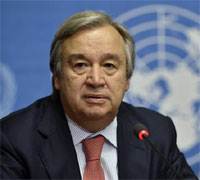
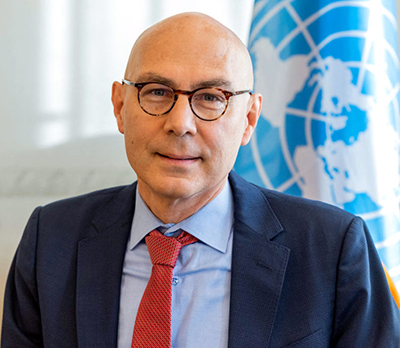
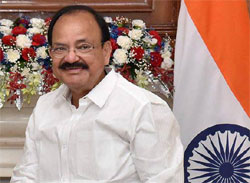 I am happy to be with all of you this evening for celebrating the Human Rights Day. Human rights are rights inherent to all human beings without discrimination. Human Rights Day, observed on 10 December every year commemorates the day on which, in 1948, the United Nations General Assembly adopted the Universal Declaration of Human Rights (UDHR). This has been a guiding document to guarantee the rights of every individual without discrimination and one that would serve as a valuable ally to the UN Charter in ensuring global peace and security.
I am happy to be with all of you this evening for celebrating the Human Rights Day. Human rights are rights inherent to all human beings without discrimination. Human Rights Day, observed on 10 December every year commemorates the day on which, in 1948, the United Nations General Assembly adopted the Universal Declaration of Human Rights (UDHR). This has been a guiding document to guarantee the rights of every individual without discrimination and one that would serve as a valuable ally to the UN Charter in ensuring global peace and security.